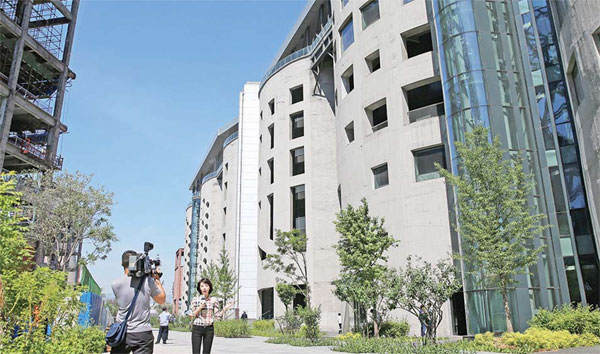From heavy metal to gold medal aspirations
Old steel mill repurposed to demonstrate frugal and sustainable approach to holding Olympic and Paralympic Winter Games
A disused complex in Beijing that once housed a major steelmaker has been transformed into a hub for organizers of the 2022 Winter Olympics.
With its abandoned furnaces and smokestacks, the former Shougang Group site, about 20 kilometers west of downtown, still evokes memories of the capital's long industrial history.
|
Former silos of Beijing Shougang Group have been refurbished as offices of the Beijing Organizing Committee of the 2022 Olympic and Paralympic Winter Games. Photos by Wang Zhuangfei / China Daily |
Yet after extensive renovations to turn silos and warehouses into offices, the complex's western section is again buzzing with activity, with 160 employees of the Beijing Organizing Committee of the 2022 Olympic and Paralympic Winter Games already busy at work preparing for the sporting extravaganza.
The relocation to the old factory, which started in April, comes after President Xi Jinping called for a frugal and sustainable approach to hosting the Games, which is in line with the International Olympic Committee's proposal to cut bidding and organizing costs for hosts.
"Resettling the committee here makes the most out of the old industrial site while implementing Beijing's vow to prepare for and host the Games in a sustainable and economic way," says Guo Huaigang, director of the committee's secretarial and administrative department.
Beijing and Zhangjiakou, in neighboring Hebei province, were named as hosts of the 2022 Winter Olympics in July. The event will be staged in three venue clusters: in the capital's downtown and northwestern Yanqing county and in Zhangjiakou's Chongli county.
While the exteriors of the steel plant's structures remain relatively unchanged, inside they have undergone a series of low-carbon refurbishments, including being fitted with solar-charged lighting and rainwater recycling, as well as functional interior decoration.
Guo says the whole process should be completed in February, when up to 1,000 employees from about 30 committee departments are expected to move into the complex.
Shougang Group began relocating from the site in 2005, as part of measures to reduce air pollution in the run-up to the 2008 Beijing Summer Olympics. Over the next five years, the steel company gradually moved its entire operations to Caofeidian in Hebei province.
After shuttering its plant in the capital in 2010, the state-owned enterprise rolled out a blueprint to revitalize the site, such as by opening an industrial park to incubate the cultural and creative sectors and urban services sector.
Liang Zongping, the board director of Shougang Group, says resettling the 2022 Olympics organizing committee was an ideal opportunity for the company to implement its ambitions for a business upgrade.
"The last time Beijing hosted the Olympics we made a sacrifice (to relocate)," he says. "This time has propelled us to reform our outmoded industry while developing new business with a new drive."
The steel company, which owns the property, has also begun planning for after the 2022 Games, when it hopes the site will be used for winter sports activities and related service sectors.
Despite the grand plans, however, concerns over the environmental safety of former industrial sites and the lack of transportation links with downtown and residential areas remain challenges.
Zhang Xudong with the Olympics organizing committee's sports department says his daily commute has doubled since his team moved to the former steel plant from its original office in north-central Beijing.
According to the Beijing city government's urban development plan, at least two new subways will be built to connect the site with other areas.
On the matter of health and safety, Liang adds that all former industrial sites that are refurbished and repurposed must pass third-party environmental assessments to ensure they are safe to use.
Yang Baojun, director of the China Academy of Urban Planning and Design, says he feels that resettling the committee in the old Shougang plant provides the city and the company with an opportunity to diversify the postindustry development of the region.
"By housing the 2022 organizing committee, the complex can evolve into a breeding ground for a fledging service sector," he says.
"The Games headquarters should encourage the city government to improve the urban infrastructure and public transportation facilities there, which would benefit the area by luring new companies and creating jobs."
On top of the large infrastructure investment needed to prepare for the Games, prudent planning can also help host cities to leverage support resources to boost less-developed regions, as shown by the 2012 London Olympics.
Since staging the Games at the economically built Olympic Park, living standards in London's East End, once its poorest community, have improved thanks to a new transport hub, abundant public sports facilities and shopping malls, which were all developed as part of the park.
Liu Yumin, executive deputy director of planning, construction and sustainability for the Beijing organizing committee, envisions that the Chinese capital's west end will enjoy a similar boost.
"The city has embraced a second chance to benefit from hosting the Olympics," he says. "It's time for the old Shougang site and its surroundings to change."

























